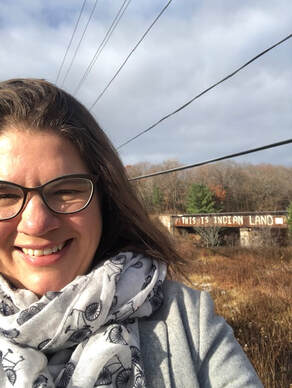 Today's profile features lawyer Maggie Wente. Several people reached out to suggest that Maggie be profiled and I agreed wholeheartedly. (If you are on Twitter, you should definitely be following her too!) 1. Tell me a little about your practice or business. I have a diverse practice that serves First Nations clients across Canada, although I primarily work in Newfoundland and Labrador and in Ontario. My firm, OKT LLP is a full service firm for First Nations clients. My practice is reasonably evenly split between litigation about equality rights (mostly concerning children’s rights and access to equal government services) and section 35 rights (aboriginal rights) and solicitor’s work, primarily in the area of First Nations governance. That usually means assisting First Nations in running their governments, from their HR matters, their agreements with other governments, their provision of social services, their lands management, and their duties and obligations as a government. I also work with a number of First Nations not for profit organizations that service urban Indigenous communities. I travel a lot – last year I took about 35 work trips all over the country. 2. Why did you go to law school? I am one of those people who always said she wanted to be a lawyer, even though I never knew a lawyer as a child (my parents didn’t even go to University). My mother is Anishinaabe and First Nations issues have long been my passion, despite the fact that I haven’t ever lived at my First Nation. My grandmother went to residential school. I knew there were injustices and I have always wanted to address injustice, especially the injustice I saw within my own family. When I was in my undergraduate degree (philosophy at McGill) there were periods that I didn’t want to be a lawyer – it seemed very establishment and I viewed myself as very anti-establishment. I was torn between law school and social work school – and then I chose both, by going to U of T’s law and social work combined program. I wanted to change the world – and I still do. 3. How did you get to where you are today? Design? Chance? Both? Definitely both, with a big dose of mentorship and people taking a chance on me. I didn’t intend to practice when I went to school and always thought I would do social work. At the time, tuition was low enough that that was an option. But as I went through both degrees I found myself thinking more and more that law was a place you could change the unfair laws and policies, and social work wasn’t very anti-establishment at all. Although “Aboriginal law” was a thing then, there wasn’t nearly the kind of opportunity there is now. It was obscure, and job prospects were few. I knew it would be hard to find a spot, and so I focused on another area of social justice that I loved – labour law. I articled at Cavalluzzo and worked for a union briefly after my articles. Shortly after I started working for the union, OKT LLP posted for an associate, which was absolutely my dream job. I felt bad about leaving the union so soon, but when I was offered a job I couldn’t turn it down. OKT was so tiny then – we were only 7 lawyers including me. It was a big change and what they don’t tell you about “Aboriginal law” is that you don’t really spend all your time thinking about section 35 of the Constitution. You spend much more of your time thinking about…well, everything else – property law, contract law, trust law, tax law, administrative law, environmental law, and so on. My law school Aboriginal law course didn’t really touch at all on the things I was doing day to do at the firm. But I had amazing patient mentors who knew so much, I was eager, my fellow associates were great, and I learned a lot in those first few years (and still do today). 4. What is your most significant achievement? What are you proud of? I often tell prospective associates or students that if you want to practice in Aboriginal rights law, you have to get real comfortable with losing. It seems like there are lots of court victories in Aboriginal rights – but those cases aren’t litigated every day. Day to day, your clients are still struggling to meet their basic needs and vindicate what seems like obvious rights. It sometimes feels like you are writing the same letter every month for 5 years trying to achieve a gain for them. Undoubtedly my biggest achievement has been my work on the First Nations Child and Family Caring Society v. Canada case – which is about inequality of funding for child welfare services provided to First Nations children. I represent Chiefs of Ontario at the Canadian Human Rights Tribunal as interveners, and have done since the remedies stage of the hearing, which is ongoing. In seeking remedies, COO was successful in getting some programs and services funded by Canada at the actual cost of providing the service. One of these is the “Band Representative” program which allows a representative of the First Nation to present the Nation’s perspective at all stages of a child’s child welfare involvement. That program hadn’t been funded for years and now that First Nations are accessing funding, we have seen amazing results. The research says that First Nations children losing connection with their communities, land, language, culture and kin in the child welfare system leads to terrible outcomes. The Band Representative program seeks to preserve those connections and keep children as close to community as possible. We have seen programs make transformative changes in young people’s lives and it has made me so happy to be a part of this work. First Nations have accessed tens of millions of dollars for this program since 2018. And when can anyone ever say they won unlimited money for a client? I can never top this one. 5. What are some key challenges, and more importantly, opportunities for women in law? A challenge which I surprisingly still face despite the considerable greying of my hair is just the everyday sexism I have to put up with from opposing counsel, some of whom aren’t even senior to me. Lately, even, I have been called kiddo, missy, been mimicked in court in a sing-songy voice, and am told how many years men have been practicing as a way to exert authority. This happens so often I actually have a chart on my office door where I and the women lawyers in my firm keep track. When I was more junior it did what it actually was intended to do – made me feel like crap and cowed me. Now that I am much older and much more confident I routinely just tell people they are being sexist jerks or and tell them to stop and return to speak to me when they can do it respectfully– which is not a popular response. That’s ok though, I’m not here to make friends, and certainly not with sexist jerks. Opportunities? Well I think there is so much opportunity for women to use all the skills in our practices that we are conditioned to have as women. Things like listening well and being empathetic and attentive and caring are incredibly useful because it makes us better at serving our clients and at reading opposing parties. And lately, I see women starting their small and innovative firms in ways that clients are really responding to and so in terms of coming out of last century’s business model, it seems to me that women are leading the way there, which is borne often out of a desire to get out of the traditional male dominated practice models that serve men’s needs, interests, and schedules. 6. What advice would you give a woman starting her legal career? Firstly, you can’t expect that it is any different than it is. Firms are firms and ultimately businesses that are resistant to change and you aren’t going to singlehandedly change law firms and what they demand from people. There is a certain amount of acceptance that is required if being in traditional private practice is what you want to do. Secondly, rely on your friends and mentors. My law school friends and lawyer friends I have met along the way are so important to me. You never know when you might need to ask a question or a favour or just lean on someone for support. Anyone who knows me knows that I have hundreds of friends and I wouldn’t have it any other way. No obligation to go that far in terms of numbers but it’s important to remember that you’re not alone and people have done this before you. Stay in touch. Thirdly, everyone has imposter syndrome to some degree (or at least every woman I know) and in the first years of practice it is totally normal to feel underwater. Just remembering that can be helpful in itself. But remember that it’s not that you aren’t good enough. Don’t let imposter syndrome hold you back, and figure out ways to think differently about yourself and your work. As the saying goes, act like someone with the confidence of a mediocre white man. -------------------------------------------------------------------------------------------------------- I love Maggie's last line and must remind myself of this from time to time. Thank you Maggie for taking the time to participate and share your wisdom. I started this blog series because I was tired of hearing about women leaving law and wanted to hear about women leading in law. The "Women Leading in Law" series focuses on good news stories and highlights amazing women succeeding in the legal profession. Each post includes the profiled lawyer's answers to six questions. Prepare to be inspired! ICYMI - previous posts profiled the following amazing lawyers: Anita Szigeti, Neha Chugh, Christy Allen & Nancy Houle, Suzie Seo, Kim Gale, Alexi Wood, Melissa McBain, Erin Best, Gillian Hnatiw, Melanie Sharman Rowand, Meg Chinelo Egbunonu, Lisa Jean Helps, Nathalie Godbout Q.C., Laurie Livingstone, Renatta Austin, Janis Criger, May Cheng, Nicole Chrolavicius, Charlene Theodore, Dyanoosh Youssefi, Shannon Salter, Bindu Cudjoe, Elliot Spears, Jessica Prince, Anu K. Sandhu, Claire Hatcher, Esi Codjoe, Kate Dewhirst, Jennifer Taylor, Rebecca Durcan, Atrisha Lewis, Vandana Sood, Kathryn Manning, Kim Hawkins, Kyla Lee, and Eva Chan.
0 Comments
Your comment will be posted after it is approved.
Leave a Reply. |
Erin C. Cowling is a former freelance lawyer, entrepreneur, business and career consultant, speaker, writer and CEO and Founder of Flex Legal Network Inc., a network of freelance lawyers.
Categories
All
Archives
June 2024
|
|
(C) 2014-2024 Cowling Legal. All rights reserved.
|
Please note I am not currently practicing law.
Information on this website does not constitute legal advice and is for informational purposes only. Accessing or using this website does not create a solicitor-client relationship. See website Terms of Use/Privacy Policy. |






 RSS Feed
RSS Feed
